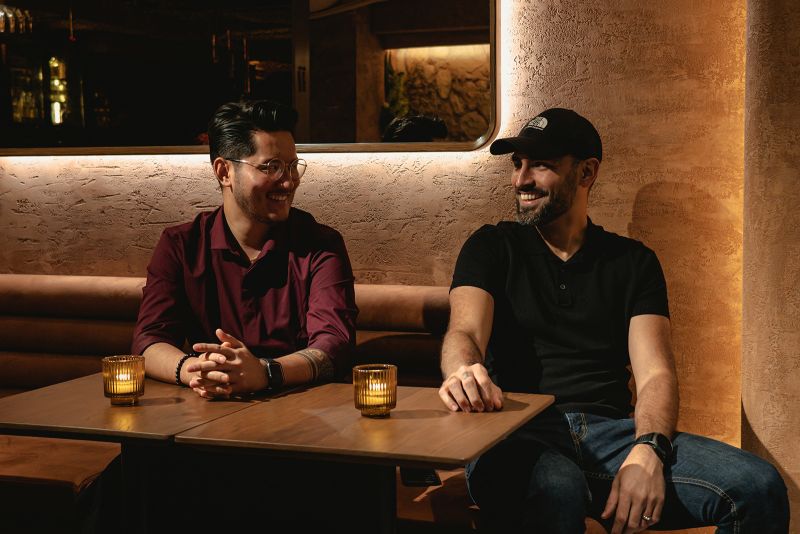Bloody Marys have been a staple of brunch menus as long as there have been brunch menus. But a new wave of bars from New York to Hong Kong has been trying to diversify their cocktail lists by including savory drinks inspired by everything from Waldorf salad to roast chicken.
Is putting a Thai beef salad tipple on a bar menu just a way to be subversive and stand out from the pack? Or is there genuine interest in these kinds of drinks?
Margaret Eby, deputy food editor at the Philadelphia Inquirer, believes that increased interest in savory cocktails is directly connected to the growing popularity of mocktails.
“The feedback is that every non-alcoholic standard drink that you get is really sweet,” says Eby, who jokingly refers to some savory cocktails as “hard soups.”
She points out that many staple cocktail ingredients, like fruit juices and simple syrups, normally have their sweet flavors offset by alcohol. But when you cut out the vodka or whiskey, the sweetness stands out a lot more.
And as global food price fluctuations make some ingredients more expensive or difficult to find, Eby thinks it’s good practice for restaurant and bar owners to branch out. With savory cocktails, she says, “you get to use a lot more of the supermarket than you would necessarily before.”
Talking tomatoes
The Bloody Mary may be the best-known savory cocktail, but tomatoes were interpreted in a very different way to create a drink called the Tomatini.
The drink was created for Mediterranean restaurant group LPM as a way to incorporate three core menu ingredients – lemons, tomatoes, and vinegar – into a beverage.
Originally introduced in 2010, the cocktail contains Ketel One vodka, white balsamic vinegar, black pepper, lemon juice and cherry tomatoes. On the rim of the glass, where it’s more common to spot a maraschino cherry or slice of lemon, there’s a tiny, perfectly round tomato.
“However, on trying it, they realized that the flavor is very delicate and fell in love.”
Presentation helps too. The drink is served in a coupe, instead of a martini glass, and is a pinkish hue with foam on top.
The Tomatini is now a staple at LPM locations around the world, including Miami, Dubai and London.
Expanding the options
Still, tomatoes – technically fruits, though they’re often lumped in with vegetables – aren’t the only ingredient that can turn a cocktail savory.
Hong Kong bar The Savory Project, which opened in May 2023, celebrates a range of ingredients not typically spotted on cocktail menus, such as beef jerky and corn husks.
“We’re not shy of using ingredients that are not common in drinks,” explains co-owner Jay Khan. “For example, using beef, using different types of fungi, like mushrooms and stuff. We play around with whatever we can think of and then try and replicate that into a drink.”
Khan previously founded Coa, a tequila and mezcal-centric bar that was named the best in Asia in 2022.
Seeing Hong Kong locals grow to enjoy these Mexican alcohols and the saltier, umami-tinged pairings was one of the reasons he chose to focus on savory drinks with his next project.
He and co-founder Ajit Gurung split the Savory Project menu into two sections, alcoholic and nonalcoholic, and use illustrations of major flavors – a mushroom, a clam, a leek – next to drink names to make them more approachable.
“We can create super adventurous drinks, but what’s the point if the people who’re drinking it do not understand the flavor that they’re drinking?” Khan says.
Meeting halfway
But not every bar has decided to go all-in on savory cocktails.
New York City hot spot Double Chicken Please has two areas – a front room with more traditional drinks and a back room with experimental cocktails for more adventurous guests.
In the back room, nine core cocktails are listed on the menu broken down into three sections: “appetizers,” “main courses,” and “desserts,” just like a food menu.
In the first group, there are drinks inspired by Waldorf salad and Japanese cold noodles; in the middle section there’s a cocktail called Cold Pizza that contains parmesan cheese.
One of the menu’s standout items is something that Tako Chang, Double Chicken Please’s manager of brand marketing and communications, calls a “reverse pairing.”
Red Eye Gravy is inspired by the popular Southern meal of country ham with gravy poured on top. But here, the roles are switched: the gravy – in this case, a mix of Irish whisky, coffee, butter and mushroom – is the centerpiece, while a piece of prosciutto is just a garnish instead of the star.
Double Chicken Please was recognized by the World’s 50 Best as the top bar in North America last year. The surge of attention means that more visitors have, as Chang puts it, “done their homework” before they come in and try anything.
Some request a specific cocktail they’ve seen on Instagram, while others have studied the menu in advance before making a reservation.
One thing is clear, though: non-sweet alcoholic drinks aren’t a gimmick.
“The savory cocktail is definitely growing,” says Chang. “There’s no doubt.”

